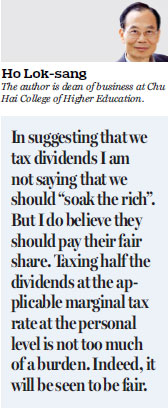Hong Kong needs to think more about tax reform
Updated: 2017-02-28 06:11
By Ho Lok-sang(HK Edition)
|
|||||||||
Ho Lok-sang notes that Hong Kong's 'low tax' regime is no longer as attractive to investors as it once was and suggests ways the tax system could be broadened and reformed
Financial Secretary Paul Chan Mo-po in his latest budget revealed that he will set up a tax policy unit "to examine the international competitiveness of our tax regime and address the problem of a narrow tax base". This proposal is most timely. Hong Kong has not had a comprehensive review of its tax structure for a long time.
As was pointed out in this column last week, Hong Kong's "low tax" regime is no longer as attractive to investors as before. There is some evidence that our competitiveness is waning. Indeed, already there is a clear trend of decline in the number of foreign corporations who use Hong Kong as their regional headquarters. For example, while the number of foreign companies with local offices in the SAR went up in 2016 to 4,255 from 4,106 a year ago, the number of regional headquarters declined from 1,401 in 2015 to 1,379 in 2016. Such a trend has shown up for several years already - at least since 2010.

Paul Chan appeared to be thinking of various tax breaks for specific sectors of the economy when he said the government would "actively study ways to foster the development of pillar industries, industries over which we have advantages and emerging industries through tax measures including enhanced deductions for I&T (innovation and technology) expenditure". But with other jurisdictions dramatically reducing their profits tax rates, we will need to boost our tax competitiveness across the board. US President Donald Trump has vowed to reduce US profits tax rates from the current level of 35 percent to anywhere between 15 percent and 20 percent. No wonder as many as 45 percent of senior executives in Hong Kong surveyed by KPMG last year indicated they were worried about Hong Kong's tax competitiveness.
As Chan said, we need to preserve our revenue base. Therefore we cannot afford to just dramatically reduce our profits tax rate without finding alternative sources of revenue. My proposal is that while we may cut the profits tax rate by half to 8.25 percent, we can treat half of all dividends distributed as taxable incomes. Taxing dividends used to be regarded as involving double taxation, as dividends are paid out of after-tax profits. But we can argue that by cutting the profits tax rate by half we are effectively leaving half of profits not taxed, thus fully justifying taxing half the distributed dividends.
In suggesting that we tax dividends I am not saying that we should "soak the rich". But I do believe they should pay their fair share. Taxing half the dividends at the applicable marginal tax rate at the personal level is not too much of a burden. Indeed, it will be seen to be fair.
In my article last week I praised Paul Chan's initiative to widen the tax bands for the salaries tax. But I would propose that these bands be widened even more. This will particularly benefit the middle class. I would, in addition, propose a mild increase in the top marginal tax rate to 20 percent, from the current 17 percent. Moreover, I would abolish the standard tax rate, which has served only to protect very rich people from having to pay according to the tax table. But what is the justification for this? The only justification is "simplicity". I would argue that this is really no justification. Other people are paying according to the tax table anyway. If this is not too complicated for others, why is it too complicated for the high-income band?
The financial secretary said: "We should be mindful of our narrow tax base, the concentration of revenue from a few industries and volatility of government revenue in response to economic fluctuations." I do agree that is a case to reconsider the Goods and Services Tax (GST), but I do not believe the narrow tax base and volatility of fiscal revenue are a concern. Given these rather extreme income disparities, letting a small percentage of rich people pay much more and the rest of the community pay much less is totally justifiable. The volatility of fiscal revenue is a virtue and not a problem, as it can soften the impact of a weaker economy and be a check on any "exuberance" when the economy is strong.
The case for GST could be justified by the existence of the underground economy. Those working in the underground economy will not voluntarily report their incomes but they should pay taxes too.
People's worries over GST stem from its potential to be regressive - that is, poor people and those on fixed pensions will be hit unduly. But this problem can easily be tackled by a lump sum tax refund that reflects the GST paid over the year by those just living modestly.
Another concern is the retail sales sector. But we are first not going to have very high sales tax, and if the middle class is benefiting from effectively lower tax rates, more people will have a higher disposable income to spend. In any case, the GST deserves to be looked at again.
(HK Edition 02/28/2017 page7)